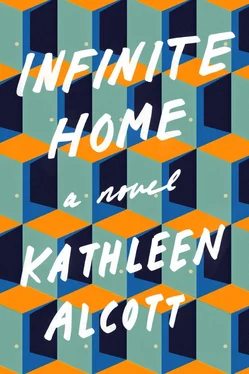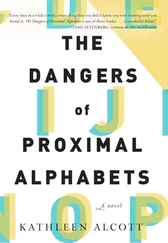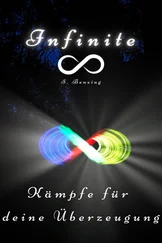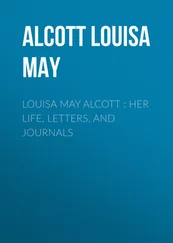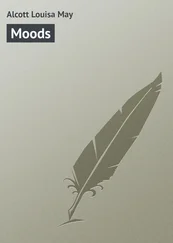But now here they were and running with them was the river and watching over them was the covering of sky. It was black so he stayed in between Claude and Eddy and held their hands and kept their lives connected. They had seen only little flashes like the beginnings of lonely ideas but not the crowd of busy angels he had come for. The water was so strong and fast that it stole the sounds of their steps but still Paulie knew and could feel very carefully how they were moving. He gave the hands he held a squeeze each time he saw the flash of a lone firefly and sent what he called mind mentions out into the night: he thought about the Great Smoky Mountains and all the people who had come to see the fireflies light up at once and about Claudia’s way of walking and Eddy’s hair sticking up and silently repeated I love you and I appreciate you, I love you and I appreciate you, I love you and I appreciate you. He thought it until the bugs caught fire hundreds revealing themselves on every side and he couldn’t squeeze their hands fast enough and the whole forest exploded transformed by light.

CLAUDIA AND EDWARD had both secretly nurtured such cynicism about the rare firefly display that the actual event left them giggling hungrily, their glee waning only to pick up another wave. The three of them stood on the path that bisected river and forest and watched as tens of thousands of seed-sized lives enjoyed intricate, urgent communication: flashing in sync or in a wave of great scale, their collected bodies casting a violent and vital green that brought all growth around it detail, then fell dark for a slow count of three, obscuring the mountainous arbor again. Each time they sparked anew it felt like the first leg of a dramatic ascent, the roaring of a spectacular motor.
When their laughter had finally settled in their bodies, they sat on the moist earth and continued to watch an algorithm so expertly designed, so decisively executed, that they never felt the nibble of mosquitoes or the swift hints of a rain. Paulie said something about this being like the beginning of the world, and Edward couldn’t even bring his eyes to roll, they were so full, and wet, and open.

IT WAS TWO DAYS LATER, as he sat on the concrete and stucco balcony of a nondescript motel in Virginia, overlooking four lanes of highway traffic, during the afternoon of a heat wave they’d decided to wait out, dressed in nothing but a pair of boxers that read Wednesday! that Paulie’s heart failed. Edward and Claudia, enraptured by a talk show — a muscular transvestite and her luminous python — heard only the slight resettling of the plastic legs of the chair as he moved.
When it came, Paulie was considering almost nothing, struck quiet by the weather’s weight on his face, still fed by what they’d seen in the mountains. In the absence of his long-kept wish to see the Smokies alight, he was carved out, weeded of ardor. He stared at a penny dropped on a balcony below, watched the traffic as though it were a complex ballet. He let the sweat from his face find its way down his body. He thought of Claudia and Edward, just behind him through the glass, how they talked to each other like children, making small promises about the next day and the next, what would happen, when, why.
The pressure seemed to knock all at once, a prickling in his fingers, a dullness in his jaw, a force on his sternum, and he felt he could answer it.
This is completely safe , he thought.

IN EDITH’S EMPTY APARTMENT, the smell of long-swollen, rotting tea bags pushed against the walls. Shadowed by the mugs left out on the table, partially hidden by a months-old newspaper, an envelope lay slightly curled, Adeleine’s writing on its backside blotted by sweat. She had made her letters tiny, unsure how long Edith’s voice would continue, and blacked out the mistakes in her transcription thoroughly, in solid boxes of ink.
He surprised me with it and I didn’t mind. I wouldn’t have known how to go about judging one building from the next, how to test the windows or floors. He walked a few feet ahead of me most of the blocks from the subway, and then when we turned onto our street he put his hands over my eyes. His fingers always smelled like tobacco and… butter, maybe, oil… and he jingled the keys and told me to look. And I was — scared. We toured every room, opened every door, turned on all the faucets. He ran around pissing a little in every toilet. We got to the top and Declan said, “Well? Well, what do you think?” And I started to cry because, honest to God, I had never had stairs before, I mean never gone up any that belonged to me, never been in a place with another person and not known exactly where they were. I grew up with June’s voice right on top of mine, her wheedly elbows everywhere I was, my mother’s face behind me in the bathroom mirror. He laughed at me a little and held my chin and he said, “Don’t worry, dove. Soon we’ll be renting it out, and you and me will be breathing all over each other again.” But I had never been alone in that way, able to sit someplace for hours knowing no one would come in. The first nights there I had to beg for sleep. I thought I could feel all the space trying to rush in, all those rooms with no living in them yet, begging for light and the tread of people, this infinite home.

WHEN IT WAS DONE, when he was transformed and handed back to her as something else, in an overly air-conditioned lobby under poorly hung photos of sunsets, the first thing Claudia wanted was a bigger purse: she couldn’t fit him into her bag. She whispered this to Edward, and Edward turned immediately to ask the man behind the counter about the closest mall. When they got in the car, they kept the windows down.
Under the fluorescence, past the garish fountains and the smell of chlorine that settled on their tongues, around diamond-shaped planters of waxy green plants, they shuffled, Claudia glancing in the windows of stores as though reviewing bills she had forgotten to pay. At a kiosk meant for teenage girls, Edward bought a shirt, then removed the polo he’d been wearing for three days and pulled the stiff T on. I love my attitude problem, it said. He held Claudia’s hand. They walked. When she finally pointed at a black shape behind glass, a sagging behemoth of leather and zipper, he placed her on the tiled ledge of a Windex-blue pool and retrieved it for her. She transferred her things into it, wallet and sunscreen and car keys, leaving the jar for last, padding the space with a sweater before placing her brother inside, and brought the metal tag along its track of teeth until the gap was closed. Her mind changed visibly on her face, as though receiving some new and crucial piece of information, and she moved the zipper back a few inches to create an opening.
—
IN THE MOTEL ROOM, Edward slept, finally, above the covers of the still-made bed, while Claudia moved through the room, the limited visibility of the near-evening, touching the detritus of her brother. From the plastic sack the crematorium had handed her, she removed his signature pink Keds and arranged them on the floor. Inside them, her feet felt for the places where his toes had made impressions, the grooves they had left much larger than the reality of hers, the indentations still slick with sweat. Almost as soon as it arrived, the small comfort of the act was gone, replaced by the tight fear that she might change something essential about the shoes’ interior. She kicked them off with a yelp, fell into a clotted weeping that kept her, blind and hot, for ten minutes. When she had quieted, the room reappeared, the wall-mounted television and the bleached floral pattern of the duvet, but amid the tawdry pastels something else found her.
Читать дальше
